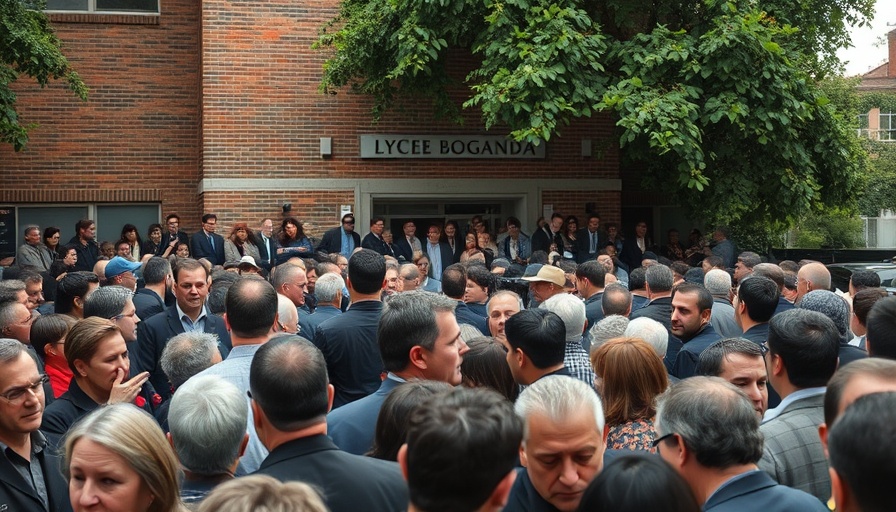
A National Tragedy: The Central African Republic Mourns
In a profound moment of grief and reflection, the Central African Republic (CAR) has declared three days of national mourning following a catastrophic incident that left at least 29 schoolchildren dead and over 250 injured on a fateful day in Bangui. The harrowing events unfolded during high school examinations at the prestigious Bélimi Boganda High School, where students gathered for their final assessments.
In 'Central African Republic declares three days of national mourning following stampede', the discussion dives into the tragic incident that led to the loss of young lives, exploring key insights that sparked deeper analysis on our end.
Prime Minister Felix Malwa's visit to hospitals housing the injured signaled the government's commitment to address this tragedy. Survivors recounted the chaos that erupted when an explosion caused a stampede, disrupting not only the examination but also the future dreams of many families.
Understanding the Incident
The chaos began with a loud explosion, reportedly from transformers near the school, sending students and staff into panic. Witnesses emphasized the horrifying scene, with bodies strewn across the grounds as emergency services struggled to restore order in the wake of overwhelming chaos. The explosion triggered a stampede that worsened the casualty count, leading to multiple injuries requiring urgent medical care.
A Community Shattered: The Parents' Heartbreak
Parents described their anguish as they rushed to hospitals, desperate for information about their children. One anguished mother recalled receiving a phone call from the police urging her to hurry to the community hospital, only to find her daughter in critical condition. This calling captures not just the individual pain of loss but mirrors the collective heartbreak that resonates through the community.
The Role of the Government in Crisis Management
This incident has sparked urgent discussions regarding the responsibilities of government institutions during crises. Accountability and transparency will be crucial in the aftermath, especially considering the need for reliable safety measures in schools. In a nation struggling with systemic issues across its health and education sectors, it raises questions about the preparedness of public institutions to safeguard the lives of young citizens.
Reflections on Education in the Midst of Crisis
The tragedy at Bélimi Boganda High School serves as a somber reminder of the vulnerabilities present in educational environments within the CAR. An estimated 5,000 students gathered there for important high school examinations, a moment that should signify hope and promise for future education. Yet, this incident underscores the urgent need for reforms in safety protocols and emergency readiness across academic institutions nationwide.
Health Infrastructure and Response Challenges
With more than 250 students injured and several fatalities, the health response to this catastrophe has been crucial. Reports indicate that hospitals in Bangui faced an overwhelming influx of patients, with 85 victims admitted at one facility alone. The analysis of how health systems responded to such unprecedented demands is essential not only for future preparedness but also for fostering public trust in healthcare services.
A Community's Resilience in Recovery
In the face of adversity, the resilience of communities often shines through. As the CAR navigates the aftermath of this tragedy, support systems will be essential for healing. Initiatives that foster solidarity, such as memorial services and community dialogues, can help families process their loss. Local leaders and government officials must also prioritize comprehensive mental health support for survivors and affected families to foster healing.
The Broader Implications for African Governance
This incident highlights broader governance concerns and reflects systemic challenges faced by the African continent. It sheds light on the urgent necessity for effective government accountability, public infrastructure development, and the importance of creating a safe educational environment. In tackling systemic governance issues, the CAR can set an example for neighbors facing similar challenges.
As Africa continues to address issues of security, public health, and education, the CAR's tragedy stands as a call to action for governments and stakeholders to prioritize the safeguarding of vulnerable populations, especially children. International collaboration may play a crucial role in helping countries like the CAR build their capacities to prevent such tragedies in the future.
Conclusion: A Call for Reflection and Action
The heartbreaking incidents at Bélimi Boganda High School should push all stakeholders to reflect on the fragility of life, especially among the young population. As we come together to mourn and support the families affected, we must also advocate for reforms that protect our future generations. To bring about meaningful change, it is essential for communities, governments, and civil society to unite in dialogue and action.
Significantly, the CAR's tragedy is a stark reminder of the urgent need for accountability within governance institutions across Africa as nations strive towards better safety and security measures for their citizens.
 Add Row
Add Row  Add
Add 




Write A Comment